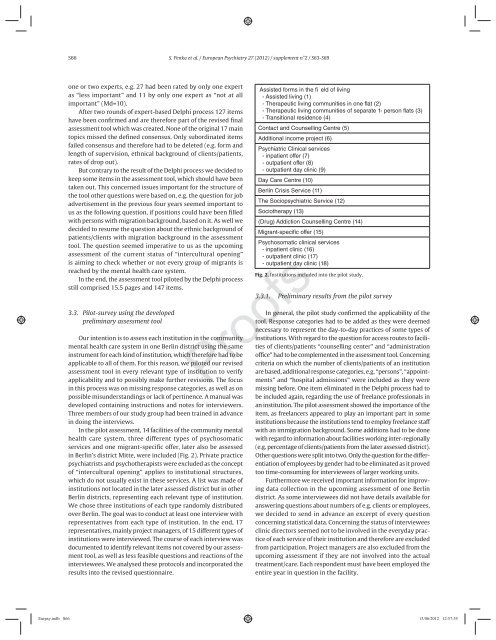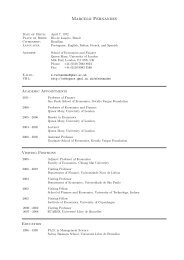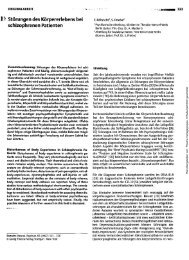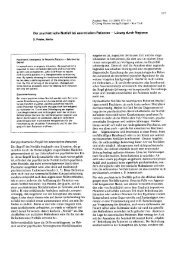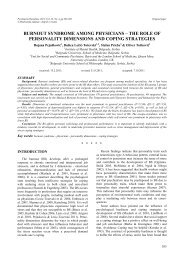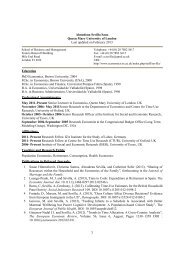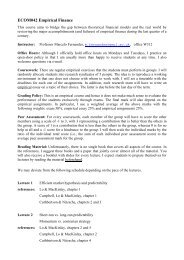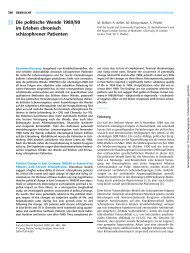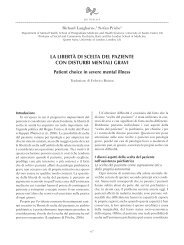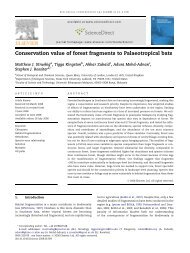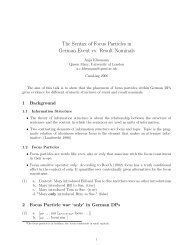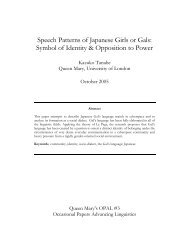Proofs - Personal Webspace for QMUL - Queen Mary, University of ...
Proofs - Personal Webspace for QMUL - Queen Mary, University of ...
Proofs - Personal Webspace for QMUL - Queen Mary, University of ...
You also want an ePaper? Increase the reach of your titles
YUMPU automatically turns print PDFs into web optimized ePapers that Google loves.
S66 S. Penka et al. / European Psychiatry 27 (2012) / supplement n°2 / S63-S69<br />
one or two experts, e.g. 27 had been rated by only one expert<br />
as “less important” and 11 by only one expert as “not at all<br />
important” (Md=10).<br />
After two rounds <strong>of</strong> expert- based Delphi process 127 items<br />
have been confi rmed and are there<strong>for</strong>e part <strong>of</strong> the revised fi nal<br />
assessment tool which was created. None <strong>of</strong> the original 17 main<br />
topics missed the defi ned consensus. Only subordinated items<br />
failed consensus and there<strong>for</strong>e had to be deleted (e.g. <strong>for</strong>m and<br />
length <strong>of</strong> supervision, ethnical background <strong>of</strong> clients/patients,<br />
rates <strong>of</strong> drop out).<br />
But contrary to the result <strong>of</strong> the Delphi process we decided to<br />
keep some items in the assessment tool, which should have been<br />
taken out. This concerned issues important <strong>for</strong> the structure <strong>of</strong><br />
the tool other questions were based on, e.g. the question <strong>for</strong> job<br />
advertisement in the previous four years seemed important to<br />
us as the following question, if positions could have been fi lled<br />
with persons with migration background, based on it. As well we<br />
decided to resume the question about the ethnic background <strong>of</strong><br />
patients/clients with migration background in the assessment<br />
tool. The question seemed imperative to us as the upcoming<br />
assessment <strong>of</strong> the current status <strong>of</strong> “intercultural opening”<br />
is aiming to check whether or not every group <strong>of</strong> migrants is<br />
reached by the mental health care system.<br />
In the end, the assessment tool piloted by the Delphi process<br />
still comprised 15.5 pages and 147 items.<br />
3.3. Pilot- survey using the developed<br />
preliminary assessment tool<br />
Our intention is to assess each institution in the community<br />
mental health care system in one Berlin district using the same<br />
instrument <strong>for</strong> each kind <strong>of</strong> institution, which there<strong>for</strong>e had to be<br />
applicable to all <strong>of</strong> them. For this reason, we piloted our revised<br />
assessment tool in every relevant type <strong>of</strong> institution to verify<br />
applicability and to possibly make further revisions. The focus<br />
in this process was on missing response categories, as well as on<br />
possible misunderstandings or lack <strong>of</strong> pertinence. A manual was<br />
developed containing instructions and notes <strong>for</strong> interviewers.<br />
Three members <strong>of</strong> our study group had been trained in advance<br />
in doing the interviews.<br />
In the pilot assessment, 14 facilities <strong>of</strong> the community mental<br />
health care system, three different types <strong>of</strong> psychosomatic<br />
services and one migrant- specifi c <strong>of</strong>fer, later also be assessed<br />
in Berlin’s district Mitte, were included (Fig. 2). Private practice<br />
psychiatrists and psychotherapists were excluded as the concept<br />
<strong>of</strong> “intercultural opening” applies to institutional structures,<br />
which do not usually exist in these services. A list was made <strong>of</strong><br />
institutions not located in the later assessed district but in other<br />
Berlin districts, representing each relevant type <strong>of</strong> institution.<br />
We chose three institutions <strong>of</strong> each type randomly distributed<br />
over Berlin. The goal was to conduct at least one interview with<br />
representatives from each type <strong>of</strong> institution. In the end, 17<br />
representatives, mainly project managers, <strong>of</strong> 15 different types <strong>of</strong><br />
institutions were interviewed. The course <strong>of</strong> each interview was<br />
documented to identify relevant items not covered by our assessment<br />
tool, as well as less feasible questions and reactions <strong>of</strong> the<br />
interviewees. We analysed these protocols and incorporated the<br />
results into the revised questionnaire.<br />
Assisted <strong>for</strong>ms in the fi eld <strong>of</strong> living<br />
- Assisted living (1)<br />
- Therapeutic living communities in one fl at (2)<br />
- Therapeutic living communities <strong>of</strong> separate 1- person fl ats (3)<br />
- Transitional residence (4)<br />
Contact and Counselling Centre (5)<br />
Additional income project (6)<br />
Psychiatric Clinical services<br />
- inpatient <strong>of</strong>fer (7)<br />
- outpatient <strong>of</strong>fer (8)<br />
- outpatient day clinic (9)<br />
Day Care Centre (10)<br />
Berlin Crisis Service (11)<br />
The Sociopsychiatric Service (12)<br />
Sociotherapy (13)<br />
(Drug) Addiction Counselling Centre (14)<br />
Migrant- specifi c <strong>of</strong>fer (15)<br />
Psychosomatic clinical services<br />
- inpatient clinic (16)<br />
- outpatient clinic (17)<br />
- outpatient day clinic (18)<br />
Fig. 2. Institutions included into the pilot study.<br />
3.3.1. Preliminary results from the pilot survey<br />
In general, the pilot study confi rmed the applicability <strong>of</strong> the<br />
tool. Response categories had to be added as they were deemed<br />
necessary to represent the day- to- day practices <strong>of</strong> some types <strong>of</strong><br />
institutions. With regard to the question <strong>for</strong> access routes to facilities<br />
<strong>of</strong> clients/patients “counselling center” and “administration<br />
<strong>of</strong>fi ce” had to be complemented in the assessment tool. Concerning<br />
criteria on which the number <strong>of</strong> clients/patients <strong>of</strong> an institution<br />
are based, additional response categories, e.g. “persons”, “appointments”<br />
and “hospital admissions” were included as they were<br />
missing be<strong>for</strong>e. One item eliminated in the Delphi process had to<br />
be included again, regarding the use <strong>of</strong> freelance pr<strong>of</strong>essionals in<br />
an institution. The pilot assessment showed the importance <strong>of</strong> the<br />
item, as freelancers appeared to play an important part in some<br />
institutions because the institutions tend to employ freelance staff<br />
with an immigration background. Some additions had to be done<br />
with regard to in<strong>for</strong>mation about facilities working inter- regionally<br />
(e.g. percentage <strong>of</strong> clients/patients from the later assessed district).<br />
Other questions were split into two. Only the question <strong>for</strong> the differentiation<br />
<strong>of</strong> employees by gender had to be eliminated as it proved<br />
too time- consuming <strong>for</strong> interviewees <strong>of</strong> larger working units.<br />
Furthermore we received important in<strong>for</strong>mation <strong>for</strong> improving<br />
data collection in the upcoming assessment <strong>of</strong> one Berlin<br />
district. As some interviewees did not have details available <strong>for</strong><br />
answering questions about numbers <strong>of</strong> e.g. clients or employees,<br />
we decided to send in advance an excerpt <strong>of</strong> every question<br />
concerning statistical data. Concerning the status <strong>of</strong> interviewees<br />
clinic directors seemed not to be involved in the everyday practice<br />
<strong>of</strong> each service <strong>of</strong> their institution and there<strong>for</strong>e are excluded<br />
from participation. Project managers are also excluded from the<br />
upcoming assessment if they are not involved into the actual<br />
treatment/care. Each respondent must have been employed the<br />
entire year in question in the facility.<br />
<strong>Pro<strong>of</strong>s</strong>


